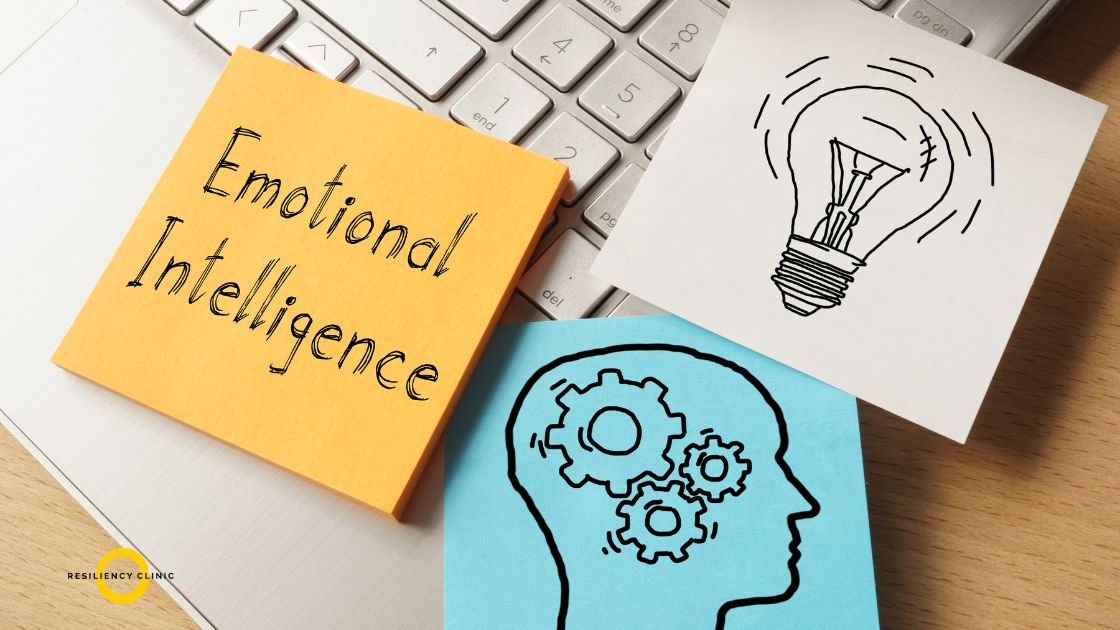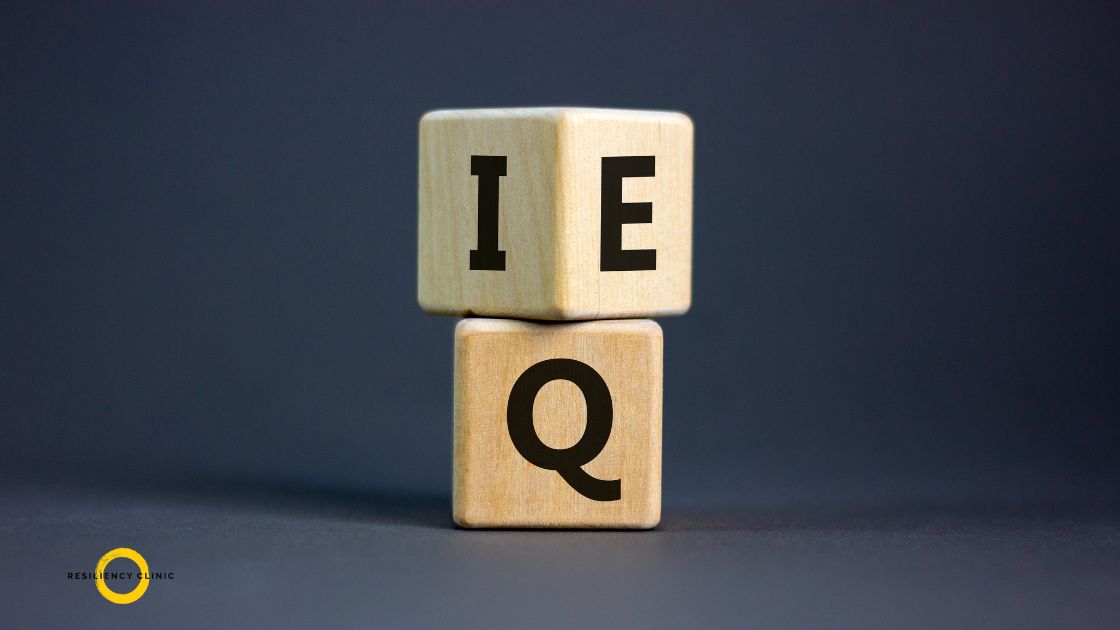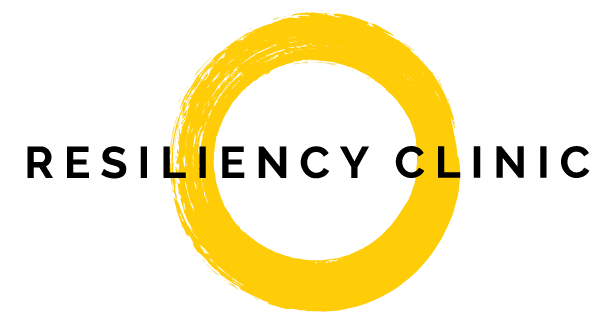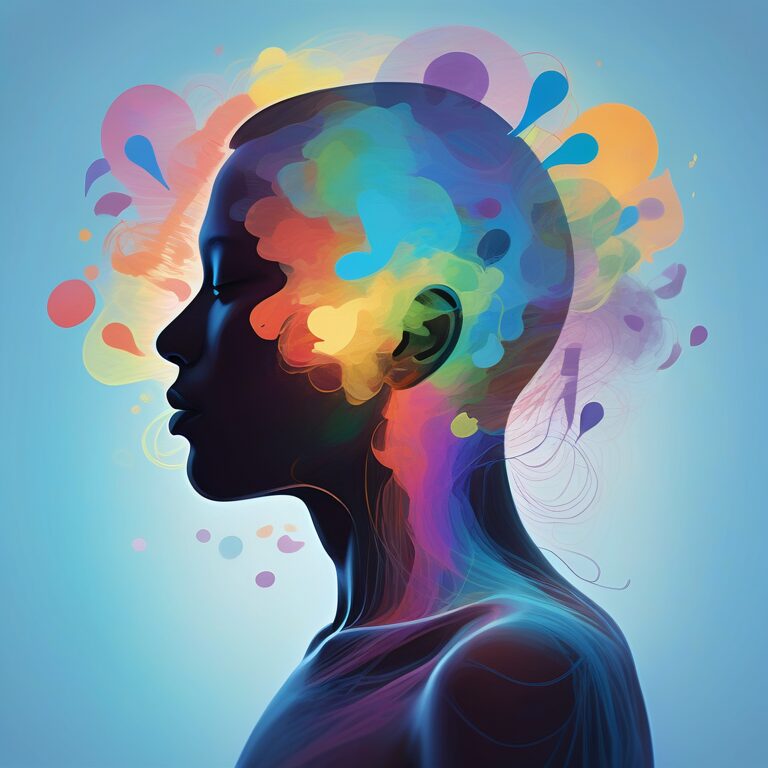Key Highlights
- Emotional intelligence (EI) is very important for success in life and at work. It impacts how we lead, connect with people, and care for our mental health.
- You can understand and manage your emotions when you have high emotional intelligence. You can also notice and change the emotions of others.
- Work on self-awareness, self-regulation, empathy, and social skills to improve your EI.
- In a job, having emotional intelligence helps you do better, lead well, and let teams work together smoothly.
- Knowing the importance of emotional intelligence and developing these crucial skills can help you grow. It can also help you build better relationships and create a kinder society.
What is Emotional Intelligence (EI)?
Emotional intelligence (EI) is the skill to notice, understand, and control emotions in you and in other people. It means being aware of your feelings and using them in a good way. It also means caring about how others feel. EI is important for doing well in life and at work.
EI in Today’s World
In today’s fast-paced world, emotional intelligence matters a lot. It helps us handle social situations, create strong relationships, and take care of our mental health. Every day, we experience changes and stress at home and work. That’s why it is important to learn how to understand and manage our feelings.
Having emotional intelligence helps us handle problems better. It makes talking to others easier when we feel stressed. It also helps us build strong and supportive relationships that feel good. With emotional intelligence, we can understand our feelings during tough times, settle disputes, and feel more empathy for others.
When we improve our emotional intelligence, we feel better about ourselves. This also makes our social environment nicer and more caring. In turn, it helps the mental health of both individuals and communities.
How Emotional Intelligence Influences Personal Growth
Emotional intelligence is key for personal growth. It helps you develop skills that are important for success and becoming your best self. This means you can understand your own emotions, strengths, and limits. By knowing these, you can use your skills better and find out where you need to improve.
Being self-aware is key to emotional intelligence. It helps you notice patterns in your thoughts, feelings, and actions. This awareness leads to a better understanding of yourself. When you know what impacts you and understand what you are good at and where you struggle, you can make choices that fit your values. This helps you feel good and boosts your well-being.
When you practice emotional intelligence, you get to know yourself more. You learn how you get along with other people. This helps you build better relationships. It improves your communication and makes you feel happier at home and at work.
The Science Behind Emotional Intelligence
New research in neuroscience and psychology shows the connection between emotional intelligence and how our brain works and grows. These studies reveal that emotional intelligence is more than just having good social skills. It involves various brain networks and emotions that affect how we see the world and relate to others.
Now that we understand how the brain is tied to emotional intelligence, we can create better training programs. These programs can improve important skills like emotional awareness and empathy. This will help people from different backgrounds connect better with one another.
Neurological Basis of Emotions and Emotional Intelligence
The brain is very complex, especially when it comes to our feelings and emotional understanding. The limbic system, known as the emotional brain, is very important for creating and handling emotions. The prefrontal cortex helps us think clearly. It helps us make choices, plan ahead, and control our emotions.
Emotional awareness is an important part of emotional intelligence (EI). It relies on how well the prefrontal cortex can understand and control emotions coming from the limbic system. The link between these areas of the brain matters a lot. It helps us notice, understand, and manage our emotions better.
By learning about how our brain handles emotional intelligence, we can understand how it affects our thoughts, actions, and relationships. This helps us see the deep link between our feelings and our thinking.
How EI Develops Over Time
Emotional intelligence is not something you are born with. It is a skill you can build and change over time. You grow this skill through your experiences and by spending time thinking about yourself. Some people may have a natural talent for emotional skills. Still, anyone can learn and improve their emotional intelligence by practicing.
Emotional intelligence training programs and workshops can teach people valuable skills. These programs help build self-awareness. They also show us how to manage our emotions better. Plus, they boost social awareness and empathy.
By thinking about themselves often, people can grow their emotional intelligence. Practicing mindfulness can also help. A higher emotional intelligence helps with better relationships and health. It can lead to more success in your job and life.

Components of Emotional Intelligence
Emotional intelligence means knowing how we feel and how to get along with others. It includes several skills that are related. These skills are like the branches of a tree. Each branch represents a different part of emotional intelligence, but they are all connected.
By understanding these parts, we can see our strengths and the areas we need to improve in emotional intelligence. This helps us work on skills that make us more self-aware. It also allows us to build better relationships and feel happier in both our personal and work lives.
Self-Awareness and Self-Regulation: The Core of Emotional Intelligence
Self-awareness and self-regulation are key parts of emotional intelligence. They create a solid foundation for other skills. Self-awareness means knowing our feelings, strengths, weaknesses, and what affects us. This understanding helps us make choices that fit our values and goals.
Self-regulation is all about managing our emotions in a healthy way, especially during tough times. It means finding ways to relax when we feel stressed or overwhelmed. It also means staying calm and strong when things are challenging.
When we combine self-awareness and self-control, we can handle life’s highs and lows better. We can choose wisely, even when things get tough. This practice helps us create healthy and balanced relationships with ourselves and with others.
Motivation and Empathy: Expanding the Emotional Spectrum
Motivation and empathy are important parts of emotional intelligence. They help us feel close to our inner drive and connect with others. Motivation lets us use our feelings to reach our goals and handle challenges. It keeps us positive, even when times are tough.
Empathy is a key part of emotional intelligence. It lets us feel what others feel and understand their emotions. This connection leads to kindness and stronger bonds with people. When we focus on and respect others’ feelings, we build a supportive environment. In such a place, understanding and teamwork can grow.
When we combine motivation and empathy, we can pursue what we love in a thoughtful way. This helps us create stronger relationships based on understanding. It also helps us handle complex human interactions with kindness and care.
Social Skills: Navigating Relationships with EI
Social skills help us show our emotional smarts. They help us build and keep strong and healthy relationships in many parts of life. This means we share our thoughts and feelings clearly. We also listen to others and respond with care and understanding to what is going on around us.
People with high EI are good at social situations. They connect well with others. They manage conflicts effectively and motivate people around them. They know that good relationships need trust, respect, and clear communication. They focus on building a positive social environment.
Improving our social skills helps us connect better with others. It can make it easier to solve problems. A good set of social skills creates a better social environment for us and for the people around us.

Emotional Intelligence in the Workplace
In today’s tough job market, having high emotional intelligence is very important. Employers want this skill for every job and at all levels. They know that just having technical skills is not enough for success. People with high emotional intelligence handle stress better. They also communicate clearly, form strong relationships, and face the challenges of today’s workplace.
When companies support emotional intelligence at work, they build a better and more productive culture. This practice helps with teamwork and working together. Ultimately, it results in more success and new ideas.
EI in Leadership and Team Dynamics
Emotional intelligence is important for being a good leader. It helps leaders connect with their teams, motivate them, and solve workplace issues. Leaders with high EI know their own feelings clearly. They recognize their strengths and weaknesses and understand how these traits affect others.
These leaders create a welcoming place. They encourage open discussions, trust, and respect among team members. Their empathy helps them understand what their team needs and how they feel. This creates a safe space where everyone feels heard and valued.
Good leaders inspire their teams by using emotional intelligence. They build strong relationships. This helps their organizations do well. They know that a culture of emotional intelligence is key to reaching both personal and team goals.
EI as a Predictor of Job Performance
Emotional intelligence, or EQ, is very important for success at work. It helps people do their jobs well, manage problems, and build strong relationships with coworkers and customers. Research shows that those with high EQ can more easily adjust to changes, stay resilient during tough times, and solve problems effectively. This skill makes them excellent team members in busy and changing workplaces.
People with high EQ feel happier at work. They create strong friendships that make the workplace enjoyable and effective. Their skill to manage stress, solve issues, and show empathy helps everyone get along. This teamwork boosts both individual and group performance.
Companies are paying more attention to emotional intelligence now. They know it plays a big role in job satisfaction, productivity, and success at work. Because of this, they look for emotional intelligence when hiring new staff and during employee development.
Strategies for Enhancing Emotional Intelligence in Professional Settings
Improving emotional intelligence is a journey that takes time. We need to look at ourselves closely. It’s important to put in effort and feel a strong desire to understand our feelings and our relationships with others. Workplaces can help by offering training programs, workshops, and assessments. These tools can help people see their strengths and find areas where they can grow.
Using tools like 360-degree feedback, coaching, and mentoring can help us learn about emotional intelligence. These methods also support personal growth. By promoting open communication, empathy, and active listening in our team, we can build a workplace that better understands emotions.
When companies pay attention to the emotional intelligence of their employees, they gain several advantages. These advantages are better employee engagement, improved teamwork, less stress and conflict, and a more positive and productive work culture overall.

Emotional Intelligence in Personal Relationships
Emotional intelligence is key for happy and meaningful relationships. It helps us trust each other and communicate better. This results in strong bonds with our partners, family, and friends. By knowing our own emotions and the feelings of the people we care about, we build a solid base for healthy and rewarding relationships.
When we use emotional intelligence in our relationships, we create a safe space. This space allows us to be honest and open. It helps us grow as individuals. Because of this, we can build stronger bonds. These connections improve our lives.
Communicating Emotions Effectively with Partners and Family
Communicating our feelings is very important. It helps us build strong and healthy relationships with partners and family. We need to share our feelings clearly and honestly. We should also listen to how other people feel.
Active listening, empathy, and nonverbal communication help us understand each other. When we talk about difficult feelings, it is important to stay respectful and show empathy. We should also look for things we have in common.
Using “I” statements to share our feelings can be useful. This keeps us from blaming others. It helps us have safe and supportive talks. We can strengthen our bonds by being open, listening well, and understanding how our loved ones feel. This will help us deal with family issues more carefully and with more understanding.
Breaking Intergenerational Trauma Patterns
Intergenerational trauma happens when emotional and mental wounds are passed down from one generation to the next. This can greatly affect family relationships and people’s mental health. It is important to see these patterns and try to fix them. By doing this, we can break these cycles and build better connections.
Emotional intelligence is very important for healing trauma that comes from past generations. It helps people see their own feelings clearly. It also helps them find better ways to deal with tough situations. This means understanding how our past experiences can affect what we do now and how we relate to others.
By taking care of ourselves and our families, asking for help when we need it, and healing from our emotional pain, we can overcome the trauma passed down from the past. This will help us build better and more meaningful relationships for ourselves and for those who come after us.
Building Emotional Bonds: The Key to Lasting Relationships
Building strong emotional ties is key to happy and long-lasting relationships. These bonds grow through shared experiences and good communication. Active listening is very important, just like being open and supportive toward one another. It’s about creating a safe space. In this space, both people feel seen and understood for who they really are.
Emotional intelligence allows us to build strong relationships. It helps us understand and feel what our partners, family, and friends are going through. This means we can show empathy and give support when times are tough. We can also share in each other’s joys and celebrate successes together.
When we focus on emotional connections in our relationships, we create trust, love, and respect. These feelings help build strong bonds. They can handle life’s challenges. This improves our lives in many ways.
Cultivating Emotional Intelligence
Cultivating emotional intelligence takes time and effort. It is a way to learn about ourselves and improve. We should think about our feelings and accept changes. This means we need to face our fears and let go of old habits.
When we see life with curiosity and a true wish to know ourselves and others, we start to grow. This journey helps us to connect better with people. It makes us feel happier and allows us to create a nicer and more peaceful world.
Practical Exercises for Developing Emotional Awareness
Developing emotional awareness means understanding what is happening inside us. We need to focus on our thoughts and feelings. It is important to notice our body sensations and actions, too. Simple exercises for self-reflection and mindfulness can help us feel more emotionally aware every day.
Writing in a journal is a great way to understand our feelings. It gives us a safe place to feel and notice what influences us. It also helps us see how we grow over time. Taking a few minutes each day to practice mindfulness meditation can help us recognize our thoughts and feelings as they happen without any judgment.
By adding these mindfulness practices to our daily routine, we can notice and understand our feelings better. This helps us make better choices and respond with more awareness and control over our emotions.
Techniques for Improving Emotional Regulation and Expression
Emotional regulation is important for emotional intelligence. It helps us manage our feelings in a positive way. This does not mean we should cover up our emotions. Instead, we need to balance our feelings. We should be aware of our emotions and express them in the right way.
There are several ways to feel better when we feel stressed or overwhelmed. Deep breathing can help us feel relaxed. Relaxing our muscles can make a difference, too. Using visualization can also calm us down. Regular exercise and enough sleep are very important for our well-being. Eating healthy food supports our mental health. These steps can improve both our physical and mental health.
It’s important to share our feelings in a clear way. We can use both talking and body language to do this. We should practice speaking clearly. We must also listen carefully and pay attention to our tone and gestures.
The Role of Mindfulness in Enhancing Emotional Intelligence
Mindfulness is about paying attention to what is happening now without judging it. This practice can improve our emotional intelligence. By focusing on our thoughts, feelings, and bodily sensations, we can understand our emotions more clearly. This awareness helps us recognize how our emotions affect our actions.
Mindfulness activities like meditation and deep breathing help us notice our feelings without judging them. This reduces the chances of reacting too fast. It helps us handle tough situations calmly and with clear thoughts. When we pay more attention to ourselves, we improve our self-awareness, self-compassion, and empathy.
As we practice being mindful, we start to notice more space between our feelings and our reactions. This helps us make better choices that align with our values. It also allows us to build healthier and happier relationships with ourselves and with others.
The Social Impact of Emotional Intelligence
Emotional intelligence is not just about feeling good. It affects how we connect with others and the world around us. It helps us feel empathy and compassion for other people. It also enables us to communicate clearly and solve disagreements. Emotional intelligence is key to building a fair and peaceful society.
When we recognize that emotional intelligence is important, we create a world that is more caring and fair. In this kind of world, people feel they matter. They feel appreciated and listened to for who they are.
EI Role in Social Change
Emotional intelligence is very important for making society better. It helps people and communities talk to each other in a clearer way. It builds connections and supports a fairer and kinder world. A high level of emotional intelligence helps us feel empathy. With empathy, we can see and understand different points of view.
Bringing social change means having tough talks. It often involves asking questions about strong beliefs and unfair systems. Emotional intelligence can help us handle these difficult discussions with kindness. It makes us more willing to listen and learn from each other.
By promoting empathy in our communities, we can build a fairer and smarter society. When we practice kindness and understanding, we open the door to real and positive changes.
Addressing Emotional Immaturity in Society Without Stigmatization
To tackle emotional immaturity in society, we need to be kind and thoughtful. We should try to understand people, support them, and help them grow instead of judging them. It’s key to know that emotional intelligence varies in each person. People develop at their own speed based on their background, life experiences, and the resources available to them.
We need to create safe spaces for people. In these places, they can feel comfortable and see how to get better. We can do this by hosting workshops, classes, or therapy sessions. These programs can teach them emotional skills. They can learn good ways to express and manage their feelings.
When we make a culture that cares about emotional intelligence, we allow people to grow. This helps them be more aware of themselves. In turn, they can build better relationships. Ultimately, this can create a kinder and more grown-up society.

Conclusion
In a world full of strong feelings, it is important to know about Emotional Intelligence (EI). EI helps us develop as individuals, succeed at work, and build better relationships. When we understand ourselves, show empathy, and communicate effectively, we can deal with life’s struggles more easily. Research shows that EI affects our emotions and helps promote peace in our communities. Anyone can improve their EI by practicing mindfulness and doing simple activities. This can make life feel happier and more satisfying. Let’s embrace our feelings because expressing them can help us achieve our true potential.
Frequently Asked Questions
What is the first step in developing emotional intelligence?
The first step to building emotional intelligence is to gain self-awareness. You can practice this by using active listening. Focus on your own emotions. Notice how these feelings affect your actions. Doing this will help you find out your strengths and weaknesses. Understanding them is important because it helps you grow other skills in emotional intelligence.
How does emotional intelligence improve personal relationships?
Emotional intelligence can improve personal relationships. It helps you understand people better. You can communicate more clearly and solve problems smoothly. By building social skills and boosting your emotional quotient (EQ), you can enjoy healthier and more fulfilling relationships.
Can emotional intelligence be learned in adulthood?
Emotional intelligence can improve as we age. It is not fixed. You can enhance it by understanding your feelings, developing emotional skills, and exploring new learning methods. This means that anyone, no matter their age, can achieve high EI and enjoy its rewards.
…
Sources
https://serval.unil.ch/notice/serval:BIB_B46FDCF00E58
https://hdl.handle.net/10654%2F36316
https://api.semanticscholar.org/CorpusID:144031083
https://pubmed.ncbi.nlm.nih.gov/21470670
https://search.worldcat.org/issn/1381-2890
https://hbr.org/2018/10/working-with-people-who-arent-self-aware
https://www.ncbi.nlm.nih.gov/pmc/articles/PMC4085815
https://www.jstor.org/stable/20159587
https://hbr.org/2015/03/research-were-not-very-self-aware-especially-at-work
https://pubmed.ncbi.nlm.nih.gov/17937602






